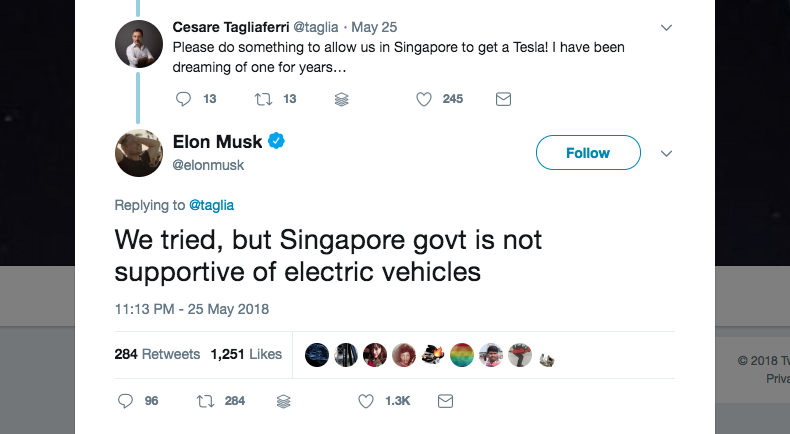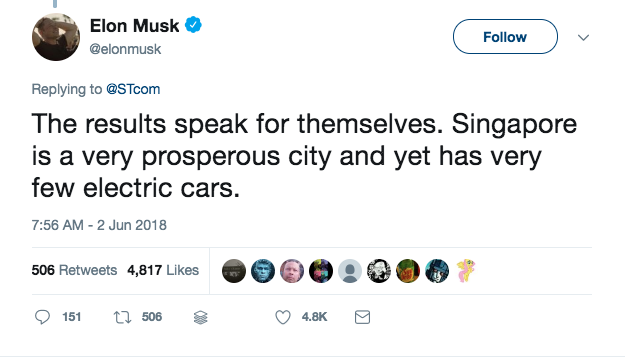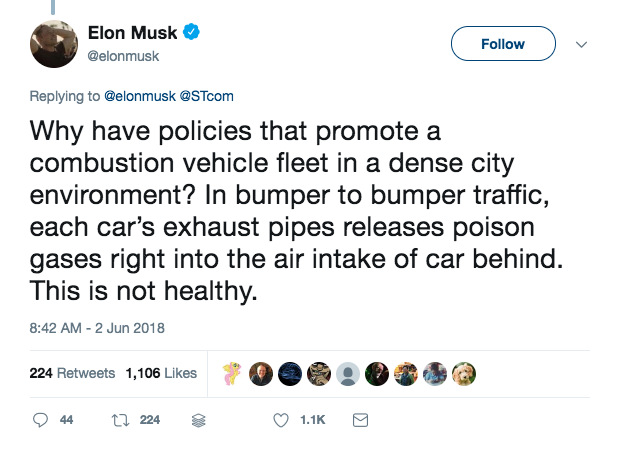Musk said Tesla had tried to break into Singapore, but the government was not ‘supportive of electric vehicles’.
On May 26, American entrepreneur Musk – who is the chief executive officer of electric car maker Tesla – tweeted in response to a netizen asking if he could “allow us in Singapore to get a Tesla”. Mr Musk had written: “We tried, but (the) Singapore government is not supportive of electric vehicles.”
His remark reignited a debate on electric vehicles in Singapore, as netizen Joe Nguyen had said in an online post in 2016 that he had to pay US$11,260 in carbon surcharges for his Tesla car. This was in addition to the seven month wait for his car to be approved and registered here.

The scene goes on when after Straits Times published a June 2 opinion piece "“Open letter to Elon Musk” by its journalist Christopher Tan, who called on Musk to quit whining about how the Singapore government doesn’t support electric cars and explained why its prosperity doesn’t necessitate car ownership.
The Strait Times opinion essentially told the Tesla founder to get off his high horse and recognise that land-scarce Singapore is not here to do any car maker any favours by helping them sell more of their products.
In summary, the article explains that Tesla cars;
• are not affordable for non-millionaires (Prices start at S$426,800 (including Certificate Of Entitlement) for a Model S 85D);
• are too powerful and will be taxed accordingly in the same band as powerful combustion engine cars;
• are not a necessity in Singapore, a country that is coping with a burgeoning population and decreasing land area;
• will ultimately be using electricity derived from non-renewable fossil-based natural gas fuel, as that is where Singapore gets its power.
Case closed? Not quite yet.



Responding to Tesla founder Elon Musk’s assertion that Singapore’s policies are not supportive of electric vehicles (EVs), the Land Transport Authority (LTA) said that it encourages the adoption of greener and cleaner vehicles such as hybrid buses and electric vehicles.
The LTA said in its media statement that it has adopted a three-pronged approach to address emissions. This includes promoting the use of green mobility options such as public transport to reduce reliance on private motorised vehicles, improving resource efficiency by managing the growth and use of vehicles, and encouraging the adoption of greener and cleaner vehicles.
The authority has also been working to build new rail lines to improve the reliability of the existing rail network, and enhancing bus services.
The LTA also noted that “EVs are not truly emissions-free, as the power they consume produces emissions at the power station”. However, most EVs are quieter than conventional vehicles and do not have tailpipe emissions, “which makes for a better living environment in a dense city like Singapore”, added LTA.
In June 2016, LTA and the Economic Development Board awarded Singapore’s first EV car-sharing programme to BlueSG, which kicked off here last December. The programme will see the firm rolling out a 1,000-strong fleet of shared EVs and install 2,000 charging points by 2020.
HDT Singapore Taxi is also conducting an all-electric trial of 100 electric taxis to determine the feasibility of using the vehicles for its operations, said the LTA.
So, Elon, .....your turn now.
Source : The Straits Times, Mothership.sg | SCMP.com



















